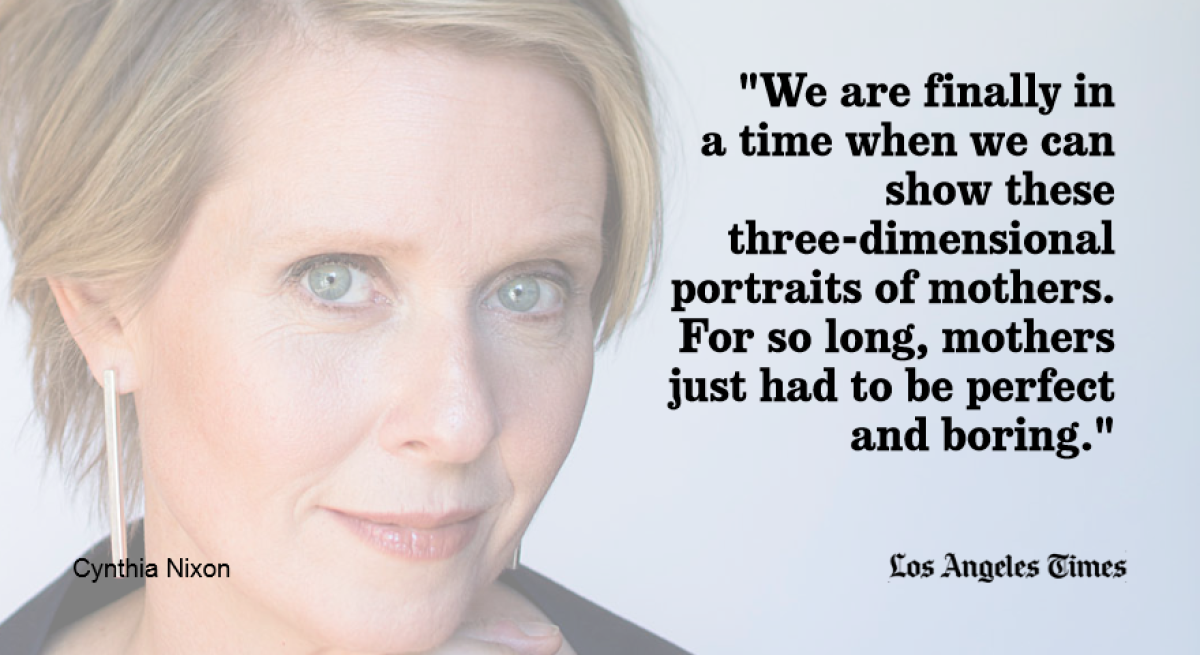Cynthia Nixon discusses her haunting role in ‘James White’
Though she’s best known for her Emmy Award-winning role as Miranda on HBO’s seminal comedy series “Sex and the City” and two feature films based on the series, Cynthia Nixon is a Broadway veteran who was all of 14 when she made her bow as kid sister to Blythe Danner’s character in “The Philadelphia Story.”
In fact, she was still a teenager when she played two roles simultaneously on Broadway in 1984’s “The Real Thing” and “Hurlyburly.” Nominated three times for a Tony, she won for David Linsay-Abaire’s “Rabbit Hole” in 2006.
SIGN UP for the free Indie Focus movies newsletter >>
Nixon, 49, is a vocal champion for LGBT causes, education and reproductive rights. She is also a breast cancer survivor.
In her latest feature film, the Sundance Audience Award winner “James White,” which opens Nov. 20, Nixon gives a haunting performance as Gail, the terminally ill mother of James (Christopher Abbott), a driftless son in his 20s. When her cancer reoccurs, James must take control of his life and help his mother. The autobiographical drama marks the debut of director Josh Mond.
The New York-based Nixon discussed “James White” during a recent visit to Los Angeles.
Was one of the reasons you were interested in “James White” because you are a breast cancer survivor?
Not at all because to me, though, cancer is part of the film, it is not at all what the film is about. But my mother did die of cancer the year we made the film. This was her third time [with breast cancer]. So she died in January, and we made the film in October.
Gail certainly isn’t the typical movie mother.

Actress Cynthia Nixon is photographed in advance of her new film, “James White.”
I thought the part was very juicy. We are finally in a time when we can show these three-dimensional portraits of mothers. For so long, mothers just had to be perfect and boring. I think she’s a complicated person and doesn’t do everything right. And she’s not all sweetness and light. She’s a fighter and a complainer. She gets on her son. She made mistakes with her son, and she’s obviously had a life that has had many triumphs but even more disappointments.
James is certainly a disappointment to her.
Yes. You know you always worry about your children. But particularly you worry about your children if you have to leave them and they are not in a secure place in their life. You see your clock running out and you think, “What can I do before I go to maximize his chances for happiness and success?”
What was it like working with Mond, who is a first-time director?
He didn’t talk a lot on the set. He just created a very safe environment. Josh’s mom commanded a lot of respect in her life in her dealings with not only her son, but her son’s friends, so I think I got some of her reflected respect. I think he viewed me as a resource the way he viewed his mother as a resource.
I really thought Mond captured the relationship between a dying parent and their child who is now the caregiver.
You know I had watched my mother die. If you have seen someone die, there are certain things that you recognize. I think he depicted it very well in the script. Everybody stops their lives, and you never feel like you are doing enough for that person. The thing about someone being ill, it is like child development. They don’t stay in one stage for very long. Just when you think you are managing a stage, there is a whole other set of symptoms and fires to put out.
The scene I found the most heartbreaking is when you leave the apartment and James and the police find you on the street in a state of confusion.
One of the things I remember so well from my mother’s last few weeks is they asked her who the mayor was. She was quiet for a long time and said, “The little guy.” We said Bloomberg? She said yes. We said, “Who is the president?” and she said, “The black guy.” We said Obama? And she said yes. She was so humiliated she couldn’t come up with those names. I said, “Mom, you knew who they were. If you think the president is FDR, that’s a problem.”
Just a few days before “James White” opens on Nov. 20, a new play you are directing, “Steve,” opens off-Broadway at the New Group.
It’s a gay play. It’s about five gay men and a lesbian. All of these people are having a midlife crisis, and it is also about the crisis of the gay-rights movement now. Now that we can be whoever we want, what is it that we actually want?
Would you ever want to direct a film?
I would not want to direct a film. It is too much pressure.
So will there be another “Sex and the City” movie?
There is talk, but you know, who knows?
More to Read
Only good movies
Get the Indie Focus newsletter, Mark Olsen's weekly guide to the world of cinema.
You may occasionally receive promotional content from the Los Angeles Times.











